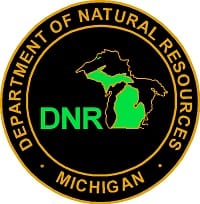Michigan DNR Allows Supplemental Feeding of Deer in Southern U.P. Counties with Permit

Due to heavy accumulated snowfall, the Michigan Department of Natural Resources will allow supplemental feeding of deer in the southern Upper Peninsula by permitted groups and individuals beginning Wednesday, Jan. 15.
Supplemental feeding is only allowed in the southern U.P. during years when accumulated early winter snowfall reaches a depth that is predictive of winter stress, while permitted feeding is allowed annually from January 15 to May 15 in the northern counties found within the Lake Superior snowbelt.
The supplemental feeding provision for the southern U.P. pertains to: Delta, Dickinson, Iron, Mackinac, Menominee and Schoolcraft counties, and south of the T43N-T44N boundary line in Chippewa and Marquette counties.
Sportsmen’s groups or individuals in these counties who would like to obtain a supplemental feeding permit should contact DNR Wildlife Division staff at the Baraga, Crystal Falls, Escanaba, Marquette, Shingleton, Newberry or Sault Ste. Marie offices.
“This winter has started out substantially more severe than last winter, which took a large toll on the deer population in the U.P., resulting in reduced reproduction and high fawn mortality,” said U.P. Regional Wildlife Supervisor Terry Minzey.
“While supplemental feeding can have unintended negative consequences, such as auto collisions, overbrowsing, and disease transmission, we recognize folks want to help deer through a harsh winter,” Minzey said. “Those who obtain a supplemental feeding permit must follow provisions that attempt to minimize any negative impacts.”
Once a permit is granted, recipients must adhere to the following regulations:
- Feeding is only allowed on private land with landowner permission, or on non-state-owned public land with land administrator permission. Supplemental feeding is not allowed on state land.
- Feed must be placed at least one-quarter mile from the nearest paved public road, at least one mile from domestic farm animals, and at least one mile from wheat or potato fields, commercial fruit orchards or commercial plant nurseries or tree farms.
- Feed can consist only of grains, second cut alfalfa and clover, and pelletized food materials containing no animal protein. The feed must be scattered on the ground at a depth not to exceed three inches. If individuals choose to feed corn, the DNR recommends it be mixed as a minor component (25 percent or less) of the recipe, which should help protect deer from dying by acidosis.
- Anyone issued a supplemental feeding permit must report to the DNR, no later than May 30, the quantity and type of feed used, dates and duration of feeding, and other required information specified in the permit.
To learn more about deer management in Michigan, visit www.michigan.gov/deer. For Upper Peninsula DNR office contact information, go to www.michigan.gov/contactdnr.

